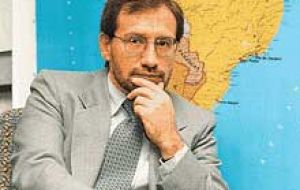MercoPress. South Atlantic News Agency
“Civil war risk persists” if Morales remains intransigent
 Gamarra claims the Bolivian governement has groups of armed peasants
Gamarra claims the Bolivian governement has groups of armed peasants Bolivian president Evo Morales should accept a credible international mediation to avoid a more serious confrontation with the opposition, or he runs the risk of triggering a civil war in the country, warns Eduardo Gamara, a Bolivian political scientist and professor at the International University of Florida in Miami.
"Peace or war is currently in the hands of Evo Morales government", argues Gamarra who adds that the Bolivian leader "returned strengthened from the presidential summit in Chile and now feels he is in a better position to confront the opposition governors accusing them of coup mongers and genocides". Bolivia is split in half with five of the resource-rich nine provinces opposing Morales plans to distribute wealth and power among the poor indigenous and peasants who openly support him and the reviewed constitution, which is to be voted next December. The opposition rejects point blank the amended constitution. "Following the Unasur meeting in Chile, hopes are that the leaders of the region effectively do something naming an independent international committee, preferably with Chile and Colombia included, to investigate the Pando incidents and open the door for a South American mediation which collaborates with Bolivia's national reconciliation", said Gamarra former head of the Latinamerican and Caribbean Studies Center from the International University. Gamarra argues that in the current confrontation circumstances the Bolivian government accusation attitude will only generate stronger reaction from the extreme groups of the opposition and in doing so, he warned, "Morales definitively is risking a civil war". The Bolivian government arrested the governor of Pando whom is accused of being behind the "massacre of 15 peasants". However Gamarra points out that what happened in Pando was "a confrontation between armed peasants sent by the Morales government and paramilitary forces from the governor" who mistrusts Ministry of Interior forces. "It's the same pattern of the last few years. The president has sent armed groups to Cochabamba, Sucre and Santa Cruz when the plebiscites or voting. They are "Bolivarian" groups considered by the government as social movements but they are financed and armed by the Venezuelan government of President Hugo Chavez", claims Gamarra. Regarding the Bolivian government accusation that Washington is behind a coup conspiration to oust Morales, Gamarra said that "the problem with the US and the Bolivian situation is not that they are doing something and getting involved, rather the contrary, that they have done absolutely nothing to prevent the crisis".




Top Comments
Disclaimer & comment rulesCommenting for this story is now closed.
If you have a Facebook account, become a fan and comment on our Facebook Page!